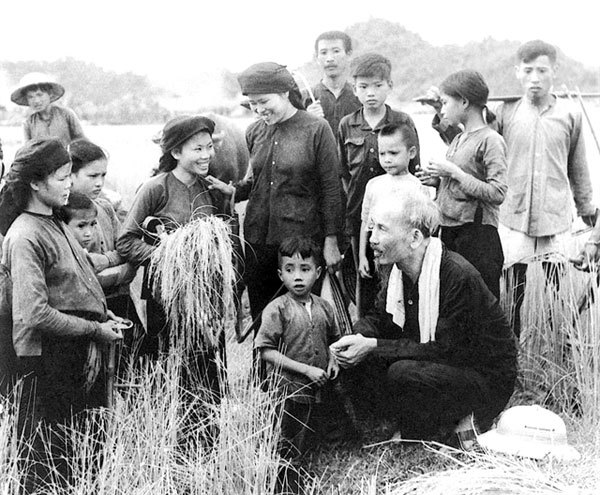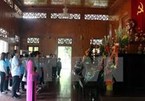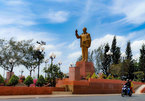 |
| President Ho Chi Minh meets farmers in Thai Nguyen Province in 1954. He was praised for his simple life and endless love for the Vietnamese people by foreign friends. — VNA/VNS File Photo |
Park told the Vietnam News Agency (VNA) that he learned about President Ho from his father’s stories about a leader who devoted his life and efforts to national independence and reunification.
After reading books on the President, the journalist decided to travel to Vietnam with his wife after Vietnam and the Republic of Korea (RoK) established diplomatic ties in 1992.
President Ho is the symbol of the relentless struggles for national independence and the reunification of the Vietnamese people, he said.
He cited documents recently found in Paris as saying that the President had befriended some Korean Provisional Government officials in 1920.
The Vietnamese leader took a long trip from Chongqing to Shanghai (China) to meet his Korean friends and congratulate them after the Korean Peninsula was liberated from the Japanese fascists at the end of World War II, he added.
A Korean who loves Vietnam, Park is keen to join the Vietnamese people in celebrating President Ho’s 130th birthday (May 19).
Vice President for the Americas and the Caribbean from the International Democratic Women's Federation Elizabeth Tortosa, who is the wife of secretary-general of the Communist Party of Venezuela Jesus Faria Tortosa, shared her memories of meeting President Ho Chi Minh in 1965.
Tortosa arrived in Vietnam as part of a campaign calling for the release of her husband who was in bad health in prison. She recalled that during a meeting with President Ho Chi Minh in Hanoi, the President inquired about her husband’s health and expressed his support for his release.
“I was impressed by the simple style, wisdom and revolutionary modesty of the President,” she said.
The meeting was one of her biggest political lessons, and President Ho Chi Minh was among the great revolutionary leaders of the 20th century, she added.
Foreign media spotlight
Artistic Director and Founder of Bangladesh’s Turongomi Repertory Dance Theatre Pooja Sengupta shared the Bangladeshi people’s feelings for President Ho Chi Minh while the Ciudad Caracas newspaper of Venezuela highlighted the late leader’s enormous contributions to Vietnam’s revolution in recent articles.
In her article, Sengupta, who choreographed a play on Ho Chi Minh’s life that was staged in September 2019, said President Ho Chi Minh was admired by a large number of Bangladeshi people who viewed him as a dedicated politician.
He travelled around the world to seek international support for national liberation and reunification in Vietnam, she wrote, noting that he was also one of the few world leaders who succeeded in the struggle using both the pen and revolutionary actions.
Recalling the production of the “Hồ Chí Minh” play, Sengupta said her crew studied the leader’s life via books, newspapers and documentaries before they wrote the script.
Reenacting the whole life and career of President Ho Chi Minh in just 40 minutes was difficult, and creating a work for the international audience was even harder, she said.
This put great pressure on the crew, Sengupta said, adding they had received considerable support from the Vietnamese Embassy in Bangladesh during the production. Artists from the Turongomi Repertory Dance Theatre and students from the Turongomi School of Dance worked enthusiastically to perform the play.
Meanwhile, an article published by Venezuela’s Ciudad Caracas newspaper reviewed milestones in the Vietnamese leader’s life, highlighting his leadership role in the historic August Revolution in 1945 that led to the founding of the Democratic Republic of Vietnam, which is now the Socialist Republic of Vietnam, and heralded an era of freedom and independence for the country.
The article also talked about the revolutionary morality of President Ho Chi Minh, who was a role model of simplicity and devotion for the sake of the nation. It affirmed that his thoughts became the ideological foundation for the Communist Party of Vietnam and the lodestar for the country’s revolution.
According to the newspaper, the national liberation cause led by President Ho Chi Minh gave Vietnamese culture a deserving stature as he was always aware of the critical importance of culture and selectively acquired the cultural quintessence of the nation and humankind. Given this, he was honoured by UNESCO as a hero of national liberation and a great man of culture of Vietnam in 1987.
Besides, the President always exerted efforts to enhance solidarity and seek solutions to liberate humankind, the article wrote, describing his life as a noble symbol of the revolutionary spirit, independence, patriotism and love for the people and justice. VNS

Uncle Ho in the heart of overseas Vietnamese in Laos
Despite being born in foreign countries and having never met Ho Chi Minh, overseas Vietnamese in Laos and Thailand always pay special respect to Uncle Ho.

Choosing the perfect place for Uncle Ho’s statue
A statue of President Ho Chi Minh waving his hand with a warm smile on his face on the Ninh Kieu wharf in Can Tho, has for a long time been a symbol of the city, which is dubbed the capital of the western region by the Hau River.
 Park Chan Kyong, a journalist in the Republic of Korea who worked for French news agency AFP for 35 years, has expressed his admiration for late President Ho Chi Minh’s endless love for the Vietnamese people.
Park Chan Kyong, a journalist in the Republic of Korea who worked for French news agency AFP for 35 years, has expressed his admiration for late President Ho Chi Minh’s endless love for the Vietnamese people.